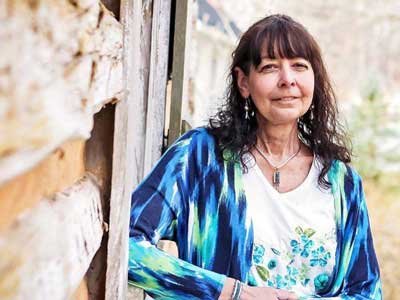
Karenne Wood Native Writer/Artist Residency Program
In November of 2021, The Humanities Research Center launched the Karenne Wood Native Writer/Artist Residency program, providing an opportunity for Indigenous writers and artists to spend time at VCU, connect with local tribes, give public talks and readings, and enrich VCU students’ learning experience.
The program honors the legacy of Karenne Wood, Ph.D., who was a member of the Monacan Indian tribe and a poet, activist, tribal historian and educator who lectured at VCU on many occasions. Wood, who died in 2019, was director of the Virginia Indian Heritage Program at Virginia Humanities, led a tribal history project for the Monacan Nation, conducted research at the National Museum of the American Indian, and served on the National Congress of American Indians’ Repatriation Commission. Her two books of poetry, “Markings on Earth” (2001) and “Weaving the Boundary” (2016) are taught widely throughout North America. In 2015, she was named one of the Library of Virginia’s Virginia Women in History.
This residency is made possible in part thanks to Virginia Humanities and VCU Foundation. We'd also like to thank the School of the Arts for providing studio space for our Karenne Wood Native Artists-in-Residence.
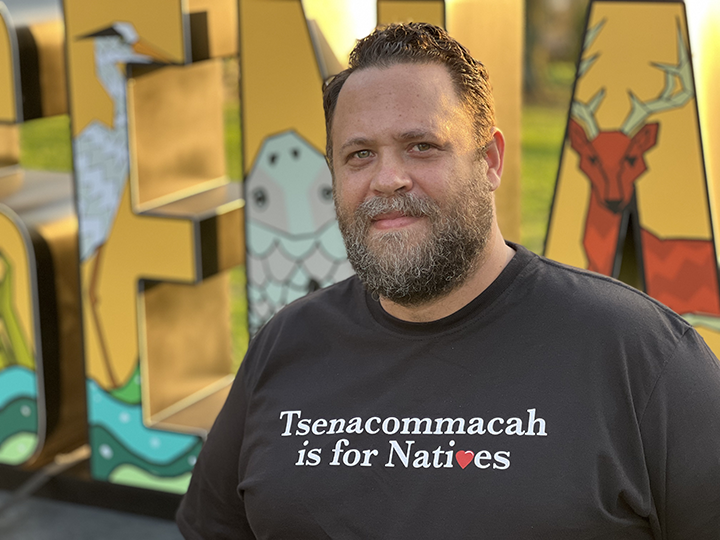
Artist in Residence 2025-26: Erick Krigsvold
Erick Krigsvold is a Pamunkey citizen, culture bearer and artist living in
Richmond, VA. His work tells visual stories of Native Americans across the
country with a focus on Virginia tribes and culture. Driven by his desire to
explore and celebrate his Indigenous identity, Erick combines digital drawing
with traditional techniques such as screen printing. Erick speaks with students
and schools about Virginia Native history and culture and uses his website and
social media accounts to facilitate tribal education and awareness. He
advocates his mission of Indigenous Education Through Art through his work at
Pow Wows and other Artist markets throughout Virginia. Erick is elevating the
under-represented Native American voice in Virginia and ensuring that the rich
stories of Virginia’s Indigenous people are not forgotten. His work can be found
at thenativestatesproject.com and on Instagram @thenativestatesproject.
Artist Statement
I am a storyteller by nature and by heritage and a self-taught digital artist. I use
digital tools to bring traditional Indigenous art and culture into the modern
mainstream. I screen print my designs onto apparel because I believe that
wearable art makes my work and native representation more accessible. I am
interested in exploring other mediums but I believe that digital art has a place in
Native American arts and crafts culture and I want to be part of that movement.
I want to replace as many images of racist mascots with authentically and
lovingly created Indigenous imagery that respects our culture and history
instead of exploiting it. I am compelled to tell as many Native American stories
as I can. As a child of the 80s, I am heavily influenced by popular culture and I
strive to create the modern interpretations of Native art that I always wanted to
see in my youth. I want to respectfully reinterpret the art that my ancestors
created in a contemporary way.
Previous Artists
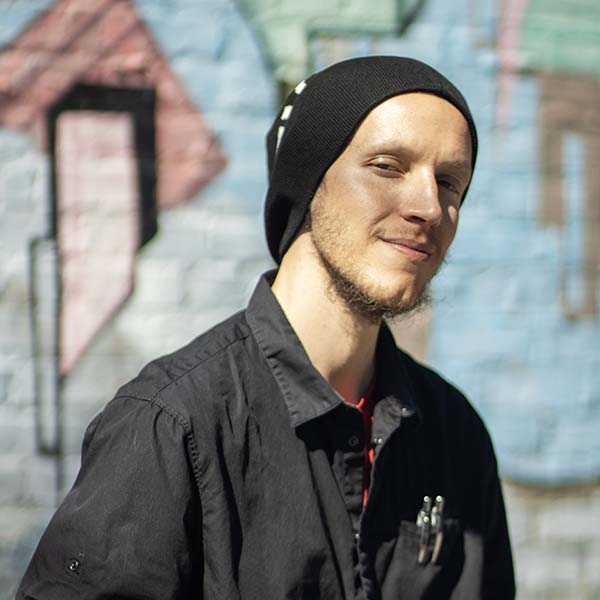
Sequoyah Fortune is a Rappahannock multimedia artist and writer, who seamlessly blends tradition with progressive modernism. Their art mirrors the complexities of multicultural identity, exploring dichotomies such as light and dark, life and death, and what is versus what could be. Inspired by traditional cultural expression, the natural world, and modern artists, Sequoyah has been involved in various artistic and cultural activities from a young age. Pottery lessons from his grandmother, dancing and drumming lessons from uncles and father, sketching lessons from their mother, and beadwork from sister and aunt—all these experiences shaped their artistic journey. As Sequoyah honed his skills across diverse media, he learned from instructors like hyperrealists Norberto Ramirez and Nigel Robertson from Fresno California. Sequoyah’s focus is to demystify art, encouraging everyone to see everyday items and activities as creative expressions. Conversations, community building, and intentional living are also forms of art for them, serving collaborative narratives, preserving history, and helping individuals understand their place in the larger world.
Fortune served as the Karenne Wood Native Artist-in-Residence in the Fall of 2024.
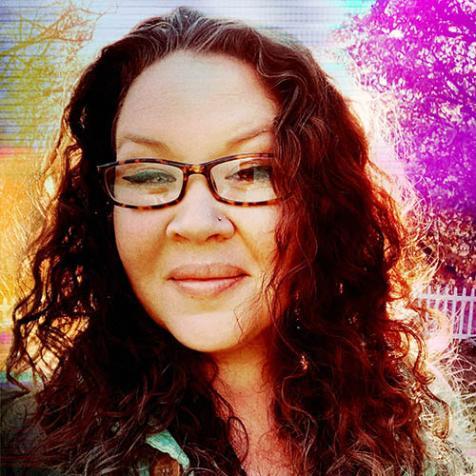
Alicia Aldaz is a textiles and beadwork artist and designer from the Monacan Indian Nation of Virginia. Growing up in Amherst County Virginia, she traveled with her family and tribe dancing and singing at powwows and native performances all over the east coast. At the age of 15, she started exploring her passion in art, and her drive to design, and create dance regalia for herself and her family for powwows. She became eager and enthralled in learning every type of traditional native sewing, beading, and textile techniques she could get her hands on, and never stopped. She has spent decades traveling all over North America learning and researching many different native artists’ divergent forms of craftsmanship and techniques, adapting them into her own contemporary design ideas. While continuously creating and designing dance regalia for her family and her tribe, Alicia’s creative passion has shifted into creating unique native-inspired contemporary wearable art for daily life to allow cultural connectiveness and representation to empower her clients. She debuted her line of Native inspired punk/street wear collection in the 2022 Virginia Tech Indigenous Community Center Fashion Show. She has been asked to return for the 2023 Opening of the Virginia Tech’s fall Community Cultural Centers’ Welcome Back Fashion Event.
Alicia has made it her own personal mission to give back the knowledge she has acquired, and she travels the country teaching classes on beadwork and sewing techniques she has learned to encourage the next generations of artists to carry on. Alicia’s sewing and beading specialties include, but are not limited to: two needle applique, one needle applique, lazy stitch, peyote stitch, bead wrapping, loom beading, rosette work, various edging/finishing techniques, quillwork, parfleche work, machine applique, southern style patchwork, and ribbon work. Alicia’s work can be found at powwows all over the country. She has shown her contemporary designs in multiple fashion shows, craft shows, and design classes.
Aldaz served as the Karenne Wood Native Artist-in-Residence in the Fall of 2023.
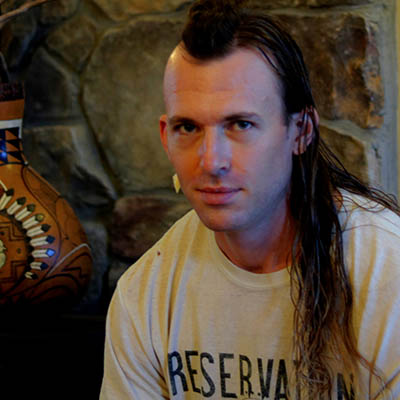
Ethan Brown is a Virginia artist working in multiple mediums including Gourd art, Oil Painting, Sculpture, and Filmmaking. He is a Pamunkey Tribal Citizen and resident of the Pamunkey Indian Reservation in King William, Virginia. A self taught artist— Ethan’s work is inspired by Pamunkey history and culture, Virginia’s flora and fauna, dreams, intuition, and spirituality. He has completed visual art commissions for the Big Ideas Company in London, England; the King William Historical Museum; Chesapeake Bay National Parks; and Reclaiming the Monument, among others. Ethan has had multiple pieces purchased by the Virginia Museum of Fine Arts for their permanent collection. As a filmmaker, Ethan has co-directed and edited the experimental short film Tsenacommacah (2020), as well as contributing additional photography to the EMMY Nominated documentary Connecting Currents- Pamunkey River: Lifeblood of our People (2020). Ethan’s newest film, First Landings (2022) is currently being submitted to National and International film festivals.
Brown served as the inaugural Karenne Wood Artist-in-Residence in the Fall of 2022, hosting a public film screening at the HRC about Indigenous Futurisms and Experiential Symbolism with fellow artist and collaborator Federico Cuatlacuatl.